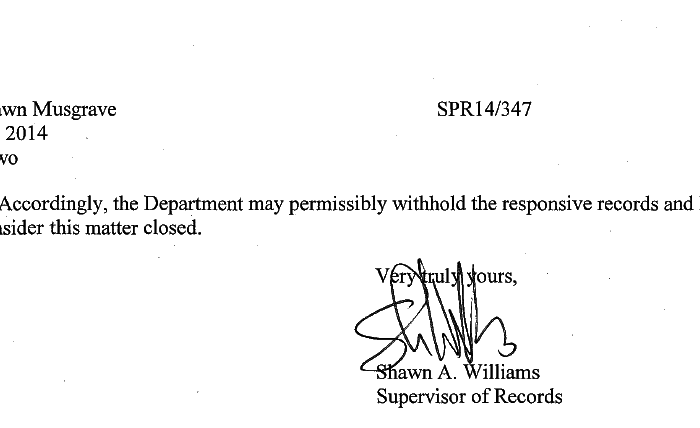For transparency advocates, with friends like Galvin …
A report in the Globe last week made public what those who deal with government transparency in Massachusetts knew all too well – the state’s terrible reputation for public records laws is well-deserved, and only made worse by the lack of help, and not direct hindrance, of the Secretary of State, William Galvin.
 Galvin oversees the Supervisor of Public Records Office, which in theory serves in the public interest as an open records watchdog, ensuring state and local agencies properly fulfill requests in a timely manner and don’t redact more than the law-mandated minimum. As we wrote back in 2012, in practice, the SPR has served as yet another obstacle between the requester and their documents. Though there were a few notable exceptions involving the SPR putting pressure on agencies that hadn’t responded to a request at all, appealing to the SPR regarding overzealous exemptions or ludicrous cost estimates is, at best, a convoluted, time-consuming process with a dismal success rate. At worst, the SPR has been a major proponent opacity, sometimes upholding exemptions solely for the sake of maintaining a precedent of secrecy.
Galvin oversees the Supervisor of Public Records Office, which in theory serves in the public interest as an open records watchdog, ensuring state and local agencies properly fulfill requests in a timely manner and don’t redact more than the law-mandated minimum. As we wrote back in 2012, in practice, the SPR has served as yet another obstacle between the requester and their documents. Though there were a few notable exceptions involving the SPR putting pressure on agencies that hadn’t responded to a request at all, appealing to the SPR regarding overzealous exemptions or ludicrous cost estimates is, at best, a convoluted, time-consuming process with a dismal success rate. At worst, the SPR has been a major proponent opacity, sometimes upholding exemptions solely for the sake of maintaining a precedent of secrecy.
Particularly in cases involving law enforcement agencies use of redaction or outright rejections on the basis of exemption, the SPR has time and time again demonstrated a vested interest in keeping docs private, routinely re-iterated the exact argument the police force had used rather than evaluating the validity of those claims. As the Globe report mentioned, this lead to several instances where these documents which were exempt on their basis of being ongoing “investigations” were decades old, with and suspects or leads long since dried up. Our own experience has been no different – an agency’s determination about whether a documents exists, or if it’s releasable, is often the first and last word we get.
When requests and appeals are unsuccessful, the only means left towards obtaining public documents is to take the agencies to court. While provisions allow for the SPR to pass cases on to the Attorney General to force uncooperative agencies to cough those records up, Galvin confirmed last Monday that he has not passed on a single public records case on to the AG in four years. Galvin’s argument was that the AG’s involvement doesn’t actually help get records released – “if anything, it delays cases,” he’s quoted as saying. But the numerous examples of documents that have only been released as a result of a lawsuit not only challenge this logic, but raise the greater issue of transparency only to those who can afford it. Court costs are prohibitively expensive for the vast majority of Mass residents, leaving them with little choice other than to wait for somebody with bigger pockets to ask the same questions.
“A commitment to transparency” is something that politicians have recently begun to acknowledge as something they need to at least pretend to have. To give credit where it’s due, Galvin office has started publishing the appeals log online – a step in the right direction that came as the result of much haranguing by our organization and others, but a step in the right direction all the same. Once the SPR’s practice of stonewalling and rubber-stamp rejection stops being viewed in a vacuum, and instead as part of a larger, and disturbing precedent, then it becomes harder and harder for Galvin to justify his stated goal of “get[ting] the public records made available if at all possible.”
With Galvin next in line for the Governorship, with the rumors surrounding Deval Patrick potentially getting tapped for the AG job – apparently unfounded, but persistent all the same – there has never been a more pressing time to make it clear that public records reform should be a priority, and that this “need to know” attitude is unacceptable. If this is what it’s like when Galvin’s ostensibly on the side of transparency, imagine what would happen if he held a position already notorious for its commitment to keeping the public in the dark?
J. Patrick Brown is the Editor of Muckrock.com, an organization which facilitates public record requests and serves as an independent news source covering government transparency issues nationwide.



